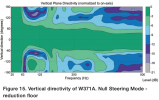Here is an example from tmtomh where they say they might have got 'more or less' equal performance from three different speakers. I would imagine these speakers would sound different from each other, likely enough so that you could pick one from another in a double blind scenario. Presuming this is the case, what is the metric for 'more or less' equal performance?
If they sound presentation is different enough they can be distinguished from each other, then it is different enough that a person can (and likely will) have a preference.
The argument that a given individual would be as happy with any number of 'flat measuring' speakers, seems to be as likely that a given individual would be as happy with a blue, green or yellow car, given the car was the same model.
It might be just my intuition, but I don't think it holds true in reality.
I think you make a very reasonable point here, and I would never claim to have any empirical evidence or logical argument that could invalidate your point.
Here's a little more about where I'm coming from: I've heard and owned many systems and speakers where I was happy with the sound but also clearly aware that there was room for improvement. I enjoyed my old B&W 705s a lot, day in and day out, for more than a decade. But I was always aware of their limitations and shortcomings, and they were never candidates for being the last speakers I'd ever own.
I've also heard setups and speakers whose perceived sound quality was just fantastic and did not seem deficient in any way. I was - and am - still very much aware of their individual
characteristics. But for me their performance level is sufficiently high that their differences from other, similarly high-performing speakers strike me as questions of preference rather than quality
per se. To put it simply, at a certain level of performance I feel like all the speakers are good enough and what matters is if their particular presentation is in a range of presentation styles/types that will continue to make you happy day after day in the long term. And that's not something one can necessarily predict or discern in shorter-term listening comparisons or home auditions, even something like a 10-day or 2-week audition.
So for example, I am fully aware that my Genelecs do not produce "envelopment," at least not with the combination of my current listening distance and my preferred/tolerable listening volume level. Sometimes I think it would be cool to be able to have that - but the key for me is that I've listened to, and in one case owned, speakers that produce a taller soundstage and more of a sense of envelopment than the Genelecs. And it was really cool - for a little while. Then I got tired of having to look up all the time to feel like I was looking at the singer, and I got tired of the cinematic drama of the envelopment. For long-term listening day-in and day-out, I enjoy a soundstage that seems large, expansive, and precise, but also makes me feel like the performance is right in front of me at a roughly 1-1 human scale, not all around me and/or gigantic. To put it another way, I've discovered over the years that I like a more intimate sound, almost like a studio monitoring sound but in a somewhat larger, relaxed hi-fi residential setting. (And now that I think about it, that's precisely what I've ended up with, with professional studio monitors in my residential listening room.)
Maybe the cardioid bass dispersion of Dutch and Dutch 8c's would sound a little better to me in some way I'm not currently aware of. Maybe adding 2x Genelec subs to the system, or replacing the Genelecs with large floorstanders or a different brand of stand-mounts plus an affordable but good-quality sub would add an extra layer of heft to the bass. You are right that I will never know unless I try it.
But at least for now, I simply don't care, because when I listen to recordings with low bass/heavy bass with the Genelecs my most common reaction is either to smile or to think, "holy moly" - nothing feels missing or deficient, nothing feels "bumpy" or "off." I feel the bass when the recording contains that information; I get the feeling of a quick impact of a kick drum or whatever when the recording has that; I am not aware of noticeable resonances or standing waves, or of any volume swells or dips as sounds move up and down the scale of bass frequencies; and so on. In fact, as I'm typing this and thinking of examples, I find myself smiling. That tells me that the bass is good enough for me.
Bottom line, I have no trouble believing that those other speakers could sound noticeably different. But I do not believe that would necessarily translate into a clear "better" or "worse" for me. I suspect I would really enjoy 8c's, and possibly LS60s (though I'm less confident that LS60s would make me as happy as the Genelecs do). Put another way, I know there are presentations produced by truly excellent speakers that are just not for me. But conversely, I also believe that there is no single one speaker system that is
the best for me. There might be only a small range of systems, perhaps - but not just one that is
the sublime object.
Maybe in the future I will feel a gradually growing discontentment with some aspect of their performance. Maybe I will start to get more and more curious about whether an upgrade to 8361a's might give me more envelopment while retaining the intimate studio-monitor precision I love so much about the 8351b's. Maybe I will say what the heck and order a pair of 8c's or LS60s to try them out, and either return them if I don't like them, or resell them or the 8351's at a small enough loss that it will have been worth the net cost to run that experiment. I fully acknowledge that this is possible - especially if a few years from now those brands have upgraded versions of those models that measure even better than the current versions.
As of now, though, I'm nearly 8 months into the Genelecs, which I think counts as long-term, and I'm still just as wowed by them as when I first got them.
Life is short, and one thing I'm pretty confident about is that I doubt I'll ever go back to passives, not only because of the issues with the crossover network but even moreso because of the sheer simplicity of using an active with built-in DSP. And I would be very surprised if I ever got another speaker whose main mid and tweeter drivers were not coaxial - the Genelecs have made me a believer in that. So that also narrows down the other speakers I might eventually consider if I do grow tired or discontented with what I have now.


